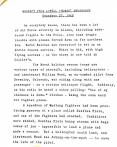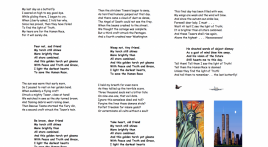"These are going to be the happiest 16 weeks of your life."
Those were the words from the captain who greeted us at Fort Knox, Ky., that mid-January day in 1953.
Sixteen weeks of combat infantry basic training were scheduled. A couple hundred kids were assigned to C Company of the 367th Armored Infantry Battalion. I was part of the 1st platoon housed in a barrack identified as Building T 550. There were kids from Pittsburgh (including me), Brooklyn, Cleveland, parts of Kentucky, New England and probably other places.
One of the first negatives I encountered was the barrack latrine. First, there was this row of eight toilets without partitions. There was a shower room with about a half-dozen shower heads that about 60 kids would be required to share everyday. As I recall, there were lavatories adjacent to a single automatic washer, a single dryer, and a laundry tub. "Whew!" I said to myself.
For me, the most memorable event relating to the latrine involved several guys from Brooklyn. During most evenings, a fellow named George, from the 2nd squad, would walk through the barrack calling out the names of four or five other guys from Brooklyn. They would all head for the latrine to "have a conference," so to speak. It was hilarious.
Our company went out on a training exercise one night. It was pitch dark - you could not see anything. The squads were separated, led to various locations and were instructed to remain very quiet. In the darkness, Sal from Brooklyn, who bunked in my barrack, stood up and yelled at the top of his voice, "Come and get me you **." Immediately a whole fusillade of M1 rifles firing blanks went off in the darkness. It seemed like they were all around me and right in my face. Not a word was spoken about the incident, then or thereafter. With all the discipline and regulations that existed, Sal must have been instructed to shout out in the darkness. I never found out what that was all about.
The barrack was integrated; that was a fairly new thing in the military in 1953. I must say that through the whole training cycle, I did not witness one incident that one could call a racial confrontation or argument.
It was my first experience in a mixed-race atmosphere. It was a fortunate one from my view. On our hikes, someone in every squad had to carry the Browning automatic rifle. It was a deadly beast of a weapon that weighed 20 pounds, about twice the weight of the M1 Garand that the rest of us carried. On those many long training hikes a black fellow named Grissom carried it in our squad. He was big, strong and mild-mannered. That thing didn't seem to bother him at all.
The Army was integrated, but not so at the same time. On those occasions where we were bused into town to dance, the whites went to their dance and the blacks to theirs.
Above all, I have to say something about my training experience. I learned to handle the M1 Garand, the Carbine, the Browning automatic rifle, the 30 caliber air-cooled and water-cooled machine guns, the hand grenade, the bayonet, the rifle grenade, the mortar, the 45 caliber handgun and the Remington shotgun. There were classes on all of them, target practice with most of them, and simulated combat situations with some of them. Just about every one of those training classed and exercised included the instructors saying, "Now when you get to Korea..." They really put emphasis on that.
A lot of the classrooms were heated by a big pot-belly stove in the middle of the room. If you were close to the stove, you had to fight dozing off. If you were away from the stove, you had to combat cold feet and hands. It was all part of the training, I guess.
Hiking was a major part of basic training. Two long hills: one called "Misery," the called "Agony," were part of almost every hike. On the way out you would go down Misery and up Agony. On the way back, after a long day of training, it was down Agony, and up the 3/4 mile long Misery. Most of those hikes were quite long and, at first, very tiring. I was amazed that by the 12th week of basic training I was in shape and could take those hikes in stride.
To top it off, I gained about 15 pounds thanks to that "delicious Army chow," as a sergeant once said.
Finally, I want to compliment the officers and non-coms who trained us. I may not have been crazy about all of them, but they were competent and dedicated. Basic training was an experience that taught me many lessons.
I believe every young man should serve his country so that he can benefit from it as I did. I must say, however, that those 16 weeks were not the happiest of my life.
Happiest 16 weeks
February 8, 2018
Submitted by:
Richard Garland, Wagontown, Pa.



